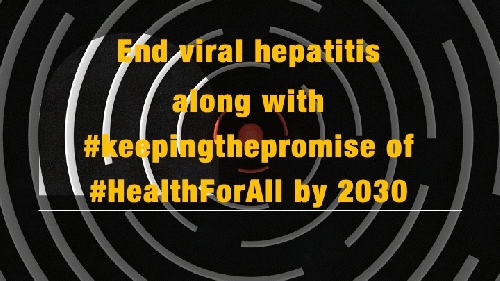Asia Pacific local leaders unite with renewed pledge to end viral hepatitis by 2030
SHOBHA SHUKLA, BOBBY RAMAKANT - CNS

Lot more action is needed to save lives from hepatitis and reduce number of new infections every year
(Image by CNS) Details DMCA
Hepatitis-B is vaccine preventable, reliable tests and treatment is available for those infected, and hepatitis-C can be diagnosed, treated and even cure is a reality now. Then why 3 persons are dying every minute of hepatitis? Over 350 million people are living with hepatitis B and C virus globally. Asia Pacific region is home to more than half of world's total number of people with Hepatitis B and C virus (about 200 million). That is why, local leaders of 79 cities in several countries of Asia Pacific region have united to power the agenda for stronger integrated action towards ending viral hepatitis as a public health threat by 2030 (a promise enshrined in the United Nations Sustainable Development Goals).
The renewed call to scale up vaccination for preventing Hepatitis-B related liver cancer along with other evidence-based public health interventions on hepatitis-B and hepatitis-C came around the World Cancer Day 2022 from the Asia Pacific Cities Alliance for Health and Development (APCAT) that connects Mayors, Members of Parliament, Governors and other local leaders with One Health approach.
These local leaders came together 6 years back to unite forces on tobacco control and prevention of non-communicable diseases (such as heart diseases and stroke, diabetes, cancers, chronic respiratory diseases, among others). They heightened their collaboration and synergy last year by including hepatitis on the agenda too. "We commit to doing everything to harness the power of our city governments to ensure that tobacco control, prevention of non-communicable diseases (NCDs), and elimination of viral hepatitis are effectively implemented and measured, along with other health and development initiatives," said Francis Anthony S Garcia, Co-Chair of APCAT and Mayor, Balanga City, Philippines.
Hepatitis is a major contributor of liver cancer
"We applaud APCAT for recognizing viral hepatitis as a major contributor to the high rate of liver cancer in the Asia and Pacific region," stated Wangsheng Li, co-founder and President of The Hepatitis Fund. "APCAT's commitment to building healthy communities is an excellent example of political will power and collective leadership. The recently launched Asia and Pacific Hepatitis Elimination Initiative by APCAT will no doubt have profound impact on the drive to eliminate viral hepatitis as a major public health threat by 2030," said Li.
But unless we control the industry whose products like tobacco make us sick, we will keep losing the gains made on public health. That is why Dr Tara Singh Bam, Director of The Union Asia Pacific and Board Director of APCAT said: "Many cancers can be prevented and treated. Courageous and accountable political leadership is needed for cancer prevention, especially to regulate unhealthy commodities' industries- such as, but not limited to, tobacco, alcohol, sugary and sweetened beverages."
(Note: You can view every article as one long page if you sign up as an Advocate Member, or higher).





